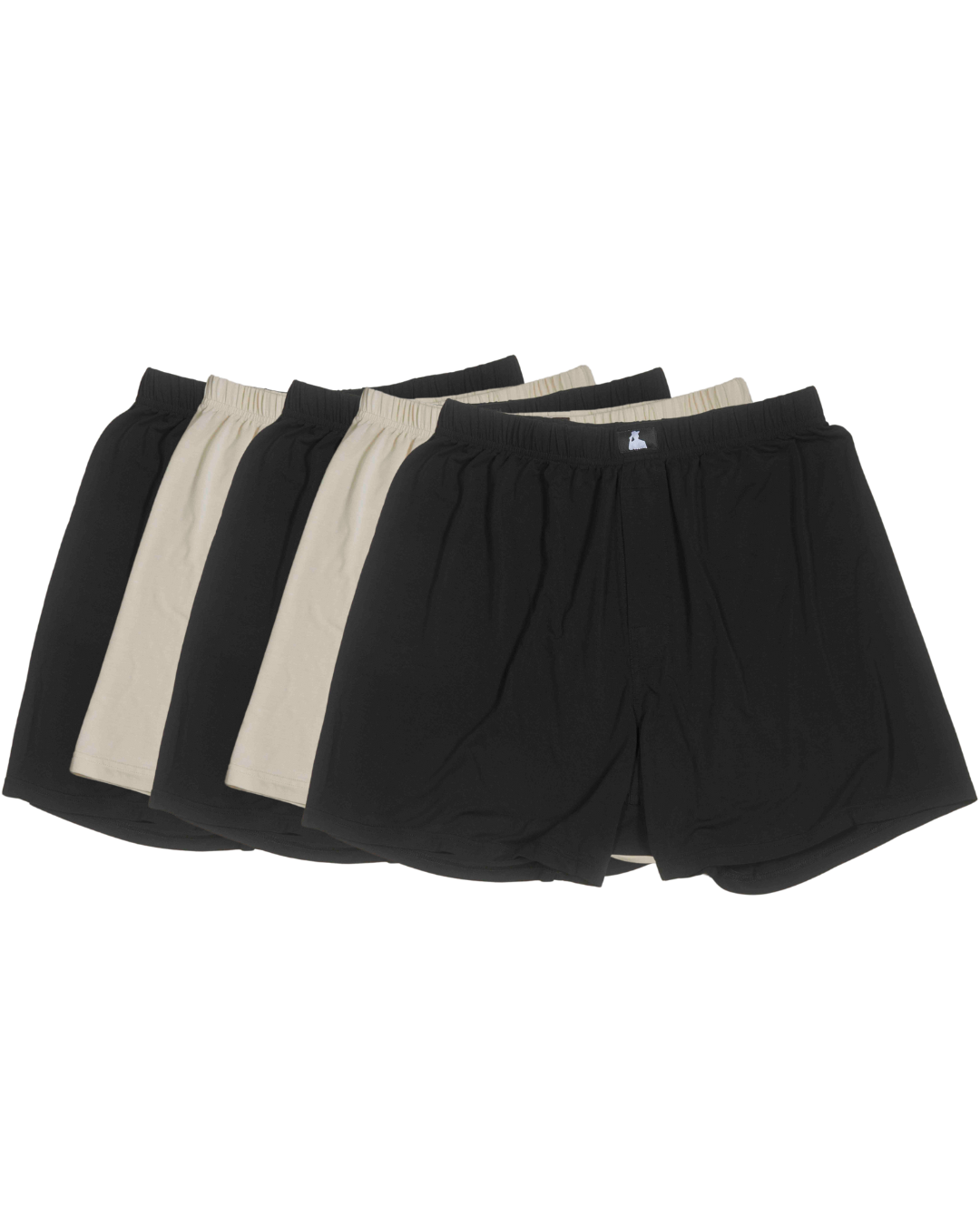Water-Based vs Oil-Based Lubricants: Which Is Safer for Fertility and Skin?
Written By The Mr. Fertyl Research & Education Team
When it comes to trying for a baby or just staying healthy “down there,” even your choice of lube matters. Couples often focus on diet, exercise and avoiding toxins - but what about what you put directly inside your body? This article looks at how water and oil based lubricants differ in terms of sperm health, skin sensitivity, vaginal pH and the environment. We’ll also sprinkle in tips for an eco-conscious lifestyle - like choosing organic, fertility-friendly fabrics (think breathable bamboo underwear) – so you can keep both your body and the planet happy. Think of it as an honest, friendly guide to making sure every slip and slide is safe and supportive of your fertility goals.
What’s in the Bottle: Water-Based vs Oil-Based Lubes
- Water-Based Lubricants: These are the most common drugstore lubes. They’re typically made of water plus a thickener (like hydroxyethylcellulose or cellulose), humectants (often glycerin, a sugar alcohol), preservatives (parabens or phenoxyethanol), and sometimes botanical extracts (aloe, fruit extracts, etc.). Water-based lubes wash off easily and feel similar to natural vaginal fluid, but they can dry out faster during use. Many contain glycerin (to retain moisture) and parabens (to prevent mold) [7][8]. Glycerin can make a product feel slick, but it can also feed yeast (potentially causing infections) [8].
- Oil-Based Lubricants: These are made from oils rather than water. This category includes pure natural oils (like coconut oil, olive oil, almond oil), vegetable oils (sunflower, grapeseed, hempseed), and petroleum products (like mineral oil or petroleum jelly). They tend to be long-lasting and don’t wash away with water. However, oil-based lubes are not compatible with latex condoms – oil will weaken latex and make it more likely to tear [6][8]. And because they’re oil, they can be harder to wash off skin and fabrics. Natural oils (coconut, olive, etc.) are usually gentle on the skin [8], while synthetic oils like baby oil or Vaseline can clog pores and irritate sensitive tissues [8]. In short, water-based lubes are easy, quick, and gentle but sometimes short-lived; oil-based lubes last longer but have trade-offs with condoms and cleanup.
Fertility and Sperm: Moving and Waiting
Sperm Motility: The biggest fertility concern with lubes is how they affect sperm movement. Studies in the lab have found that many common lubricants dramatically slow down sperm. In fact, dozens of water-based lubes can halt sperm motility quickly in vitro [1][2]. A classic fertility and sterility study found that famous lubes like KY and Surgilube left sperm virtually immobile, whereas simple substances like pure vegetable oils or glycerin had minimal effect [1]. In that 1975 study, petroleum jelly (Vaseline) and glycerin were “lubricants of choice” when infertility was a concern, because they preserved sperm motility [1].
A more recent lab analysis confirms this pattern. Mowat et al. (2014) tested several “sperm-friendly” lubricants. They found that a specialized fertility lube (Pre-Seed®) and mineral oil (Johnson’s Baby Oil) caused no significant drop in the percentage of motile sperm, whereas other water-based lubes (even “natural” ones) significantly reduced sperm movement [3]. In other words, many off-the-shelf water-based lubes – often filled with glycerin or preservatives – can bind up sperm and impede their swimming. By contrast, simple oils or fertility-formulas that mimic semen tend to be gentler on sperm [1][3].
Fecundity In Real Life: Lab tests can be dramatic, but the real-world impact of lubricant use on pregnancy chances is less clear. Two large fertility studies found no significant difference in pregnancy rates between couples who used lubes and those who didn’t. Steiner et al. (2012) followed 296 women trying to conceive and showed that those who used vaginal lubricants had essentially the same chance of conceiving each cycle as those who didn’t [2]. Likewise, a 2018 Danish-American cohort study found that lubricant users were just as likely to become pregnant over time as non-users [4]. In fact, none of the lubricant categories (water, oil, silicone) was associated with reduced fertility in those data [4].
Bottom Line: To be safe, avoid generic lubes when trying to conceive. If dryness is a problem, opt for a “fertility-friendly” or “sperm-friendly” lube that is specifically formulated for conception. These usually use a water-based gel made of hydroxyethylcellulose or similar ingredients (no glycerin or parabens) and are pH-balanced for semen. The Mayo Clinic notes that hydroxyethylcellulose-based lubes have been shown not to decrease sperm motility, because they mimic natural cervical mucus [7]. In practice, using a fertility-formulated lube (like Pre-Seed® or similar) is best – it won’t harm sperm [3] and provides needed lubrication without sticky after-effects.
Takeaway: Most everyday water-based lubes can slow sperm [1][2]. Oil-based natural oils (coconut, olive) or mineral oil tend to be gentler on sperm [1][3]. But real-world studies show no drop in pregnancy rates as long as appropriate lubes are chosen (no spermicide, pH-balanced) [2][4]. When TTC, pick a fertility lube (hydroxyethylcellulose-based, no glycerin/parabens) or use a non-latex condom if using oil-based. And remember: lubricant use doesn’t improve fertility on its own – it’s just for comfort [2][7].
(Pro Tip: While choosing the right lube, think about fabrics too. Synthetic or tight underwear can hold heat and moisture, which isn’t great for sperm production. Breathable, natural fabrics help keep things cool, offering a small extra boost to testicular comfort and overall health.

Boxers That Trap Heat Hurt Sperm
Shop Fertility FriendlySkin Sensitivity and Comfort
Your private parts have delicate skin, so irritation is a major concern. Here’s how lubricants stack up:
- Water-Based Lubes: These are generally gentler and less irritating than heavier substances [8]. The Cleveland Clinic notes that water-based lubes “are often the least irritating,” since they’re mostly water and lack oil or heavy oils [8]. That said, the additives in some water gels can cause problems. For example, products with glycerin, parabens or chemical preservatives (like chlorhexidine) can dry out tissue or provoke sensitivity [5][8]. Some women report that glycerin-based lubes give them yeast infections or burning (Cleveland’s Dr. Crawford even advises staying away from glycerin because it “may lead to a yeast infection” [8]). Scented lubes and “warming” formulas often have extra chemicals that can irritate the vulva. In short, choose a simple, unscented water-based gel (look for ones with aloe vera and vitamin E instead of harsh preservatives) [8].
- Oil-Based (Natural Oils): Natural oils can actually be soothing to genital skin. The Cleveland Clinic explicitly approves of organic oils like coconut oil, olive oil or sunflower oil as intimate lubricants, noting they “typically don’t cause vaginal irritation or lead to infection” [8]. These oils can feel nourishing and often have natural antimicrobial properties (coconut oil is mildly antibacterial and anti-fungal). They also don’t wash away quickly, so moisture lasts. However, on the downside, oils can leave a residue. Synthetic oils like baby oil or petroleum jelly (petrolatum) are generally not recommended for sensitive areas – they can trap bacteria and clog pores, leading to irritation or breakouts [8]. (Indeed, Cleveland Clinic warns that baby oil and Vaseline® “can irritate delicate tissues, especially in your vagina” [8].) Also remember oils stain sheets and can weaken condoms, so they’re best for those not relying on latex birth control.
- Skin Reaction: Everyone’s skin is a bit different. If you or your partner have known sensitivities (eczema, allergies, history of yeast/bacterial infections, etc.), read lube labels carefully. Avoid fragrances and dyes entirely – these almost always cause irritation [8]. You might prefer lubes labeled “hypoallergenic” or even try pure aloe vera gel as a water-based alternative (though aloe alone can dry out quickly [8]). On the penile skin side, some guys find that certain lubes cause itching or redness. Again, products with fewer ingredients are safer.
- Temperature and Breathability: One under-the-radar tip is underwear choice. Non-breathable fabrics can cause heat buildup and chafing. Bamboo fiber is naturally moisture-wicking and soft, which helps keep genital skin dry and cool. For men, wearing loose-fitting bamboo underwear can complement any lube choice by reducing sweat and friction around the penis and scrotum. In summary, pairing gentle lubes with breathable underwear provides a one-two punch for sensitive skin: good lubrication and a cool, dry environment.
Vaginal pH and Microbiome
The vagina is naturally acidic (normally around pH 3.8–4.5 [9]) thanks to beneficial Lactobacillus bacteria. This acidity protects against infections. When semen enters (pH ~7–8), the vaginal pH temporarily rises to allow sperm to survive [10], but then hormones and bacteria quickly restore acidity.
Why pH Matters: Some lubricants can alter this delicate balance. Generic water-based lubes often have a neutral or slightly alkaline pH, which isn’t hugely harmful, but if a lube is too alkaline or too acidic it can throw off the environment. Fertility-friendly lubes are usually formulated to be “pH neutral” (around 7) to mimic semen without drastically upsetting the vaginal flora. In contrast, spermicidal additives (like nonoxynol-9) are often highly alkaline and can be caustic.
The key is to avoid lubes with ingredients that change acidity or kill good bacteria. For instance, lubricants with high osmolality (sugar-based humectants like glycerin or propylene glycol) can damage epithelial cells and reduce Lactobacillus growth [5]. Also, preservatives like chlorhexidine are toxic to Lactobacillus [5] (one study found chlorhexidine-containing lubes dramatically reduced lactobacilli and could raise infection risk). So look for pH-balanced products specifically intended for sexual health. Some brands even guarantee their pH is around 7 and say “physiologic” or “for fertility use.”
Tip: Checking the pH is easy if you buy fertility-friendly lubes or look for “vaginal pH balanced” on the label. And remember, after sex it’s wise to gently rinse (for both partners) to flush out any residual lube or semen, allowing natural vaginal acidity to reassert itself. Wearing bamboo underwear at night or day helps by allowing any moisture to evaporate without trapping it – another small way to maintain the vagina’s healthy acidic environment.
Watch Out for Chemicals
Labels can be scary, but knowledge is power. Here are some common lube ingredients that fertility and health conscious people often avoid:
- Glycerin (glycerol or glycerine): A sweet, moisturizing agent in many water-based lubes. It feels nice, but it can feed yeast. The Cleveland Clinic warns that glycerin “may lead to a yeast infection” [8]. It can also raise the osmolality, pulling moisture out of tissues. If you’re prone to yeast infections, skip the glycerin-heavy products.
- Parabens (methylparaben, propylparaben, etc.): These are preservatives to keep the lube shelf-stable. They’re known to have broad-spectrum antimicrobial activity [5] and have been linked to endocrine disruption in studies. Parabens can kill off the helpful Lactobacillus bacteria in the vagina, raising the risk of bacterial vaginosis. Many “natural” lubes now advertise “paraben-free” for this reason.
- Propylene Glycol: Another common humectant. It makes the gel hold water, but like glycerin it can irritate some people’s skin (Cleveland suggests avoiding propylene glycol in lubes [8]).
- Chlorhexidine Gluconate: Sometimes used as a disinfectant in medical grade gels. Avoid it for sexual use. Research shows chlorhexidine dramatically inhibits Lactobacillus growth [5] and can burn sensitive tissue.
- Nonoxynol-9 (N-9) and other spermicides: These are sperm-killers, and will obviously destroy sperm. They also dangerously disrupt the mucous membranes and are linked to higher STI risk due to irritation. Stay away if pregnancy is desired.
- Fragrances and Flavors: Pretty smells can mask chemicals, but fragrances are one of the biggest culprits of irritation and allergic reaction [8]. If a lube smells perfumed or fruity, it probably contains artificial fragrances – best avoided for vaginal use.
- Warming/Cooling Agents: Labeled “warming” or “tingling” lubes often contain menthol, capsaicin, or other chemicals. These can feel fun but may cause burns or discomfort for already sensitive skin. Avoid them if fertility (or comfort) is your goal [8].
In short, less is more. The best lubes have a short ingredient list with familiar, gentle substances: purified water, cellulose, aloe vera, etc. The Cleveland Clinic recommends aloe and vitamin E as good additives, and definitely steer clear of the above nasties [8]. When in doubt, check reviews or choose products labeled “FDA-approved for fertility” – they must meet certain criteria to earn that tag.
Environmental Impact
Your lube choice can also reflect your eco-values. Here’s how to think green:
- Oil-Based Formulas: Traditional oil-based lubes often rely on petroleum products (like mineral oil, paraffin, petroleum jelly) or petrochemical ingredients. These are derived from fossil fuels, so they have a larger carbon footprint and are not biodegradable. Wasting oil-based lubes (rinsing them down the drain) essentially puts petroleum into waterways. On the plus side, if you use natural plant oils (organic coconut or olive oil), those are renewable and biodegradable – though still packaged in plastic or glass.
- Water-Based Formulas: These contain water (renewable) and a mix of ingredients. Some modern water-based lubes use plant-derived thickeners and natural preservatives. They’re generally easier to wash off and drain away. However, beware of high-sugar-content lubes (they can feed bacteria in wastewater) and plastic applicators or single-use packets.
- Packaging and Waste: Both types often come in plastic bottles or tubes. Every product you use can add to landfill or microplastic pollution. To lessen impact, choose products with recyclable packaging or buy in bulk to reduce waste. Some brands offer refill pouches. Also, pick simple formulas to avoid toxic waste by-products.
If you lean eco-conscious, try doing the following:
- Choose plant-derived lubes: Organic coconut oil or olive oil can serve as makeshift lubricants in a pinch – just make sure to use a fresh, pure oil (and remember, no condoms with these!).
- Use reusable applicators or glass bottles: If you have silicone-based lubes, use washable dispensers instead of disposable packets.
- Lower your carbon underwear: Yes, underwear! Just as a healthy diet is part of fertility, so is keeping your reproductive organs cool and clean. Our bamboo underwear is designed with eco-living in mind: bamboo grows fast with minimal water and no pesticides. Its fabric is soft, antimicrobial, and breathes well, so it reduces sweat and odor without synthetic chemicals. By choosing bamboo underwear, you reduce both environmental impact and the chance of skin irritation, a win-win for fertility and sustainability.
Ultimately, integrating sustainable choices in intimate products helps the planet and may even improve your own reproductive health. Every small decision, from lube ingredients to clothing, adds up.

Designed for Dads To Be
Upgrade to Mr. FertylQuick Guide: Choosing Your Lube and Lifestyle
- For Fertility: If you’re trying to conceive, avoid most generic lubes. Use a fertility-certified water-based gel (hydroxyethylcellulose) or a pure natural oil. Check for “fertility safe” or FDA-approved labels.
- For Sensitive Skin: Go for unscented, glycerin-free water-based lubes or natural oils (coconut, olive, etc.) and skip additives. After sex, rinse gently and let everything air dry before putting on underwear.
- pH Check: A healthy vagina needs to stay acidic (pH ~4). Fertility lubes are usually pH-balanced; also avoid spermicides or alkaline washes (vinegar-based douches) that can raise vaginal pH too high [9][10].
- Chemical Watchlist: Steer clear of parabens, chlorhexidine, nonoxynol-9, synthetic fragrances/colors, and heating/cooling agents, these can harm sperm or irritate tissues [5][8].
- Environmental Consciousness: Opt for eco-friendly products and packaging. Consider lubricants made from organic or plant-based ingredients, and recycle your lube bottles. Embrace sustainable lifestyle choices like bamboo underwear (it’s naturally grown and processed with fewer chemicals) to keep your testicles cool and skin clear – both of which support fertility.
- Contraceptive Note: Never use oil-based lubes with latex condoms. If you rely on condoms, stick to water or silicone based lubes for safety [6][8].
Choosing a lubricant isn’t just about comfort, it’s about taking care of your fertility and health in a holistic way. By understanding the trade-offs between water and oil based options, avoiding harmful additives, and pairing good lube choices with healthy habits (like moisture-wicking bamboo underwear), you’ll create an intimate environment that’s safe, sustainable, and sperm-friendly.
- Goldenberg RL & White R, 1975. The effect of vaginal lubricants on sperm motility in vitro. Fertility and Sterility. Source.
- Agarwal A et al., 2008. Effect of vaginal lubricants on sperm motility and chromatin integrity: a prospective study. Fertility and Sterility; Steiner AZ et al., 2012. Effect of vaginal lubricants on natural fertility. Fertility and Sterility. Source.
- Mowat A et al., 2014. The effects of vaginal lubricants on sperm function: an in vitro analysis. Journal of Assisted Reproduction and Genetics. Source.
- McInerney KA et al., 2018. Lubricant use during intercourse and time-to-pregnancy: A prospective cohort study. BJOG: An International Journal of Obstetrics & Gynaecology. Source.
- Łaniewski P et al., 2021. Clinical and personal lubricants impact growth of vaginal Lactobacillus species and colonization of vaginal epithelial cells: an in vitro study. Sexually Transmitted Diseases. Source.
- Harris-Ray N., 2024. Are Lubricants Significant to Fertility? WebMD. Source.
- Ogle A., 2023. Trying to Get Pregnant? Select a Lubricant That Is Most Helpful for Sperm. Mayo Clinic Health System. Source.
- Cleveland Clinic, 2023. Lubricant Alternatives: What To Use and What To Avoid. Cleveland Clinic Health Essentials. Source.
- Cleveland Clinic, 2018. Gardnerella vaginalis: Causes, Symptoms & Treatment. Cleveland Clinic Health Library. Source.
- Nall, R. (2024, July 1). Vaginal pH balance: Normal levels and natural remedies. Medical News Today. Source.

